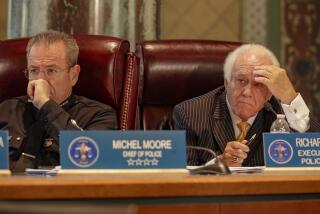LAPD Reforms Behind Schedule, Bratton Says
Los Angeles Police Chief William J. Bratton said Monday that the city will not meet a June deadline for completing police reforms that stemmed from the Rampart scandal, ensuring that the federal government will continue to monitor the department.
The delay would mark a setback for the LAPD, which has been trying to implement reforms agreed to under a 2001 settlement reached with the U.S. Justice Department after a major police corruption scandal in the 1990s involving rogue officers who beat and framed suspects.
The extension could mean an additional cost to the city of $30 million to $50 million a year, according to city officials, although police dispute that figure.
âI can guarantee the consent decree is going to be extended, but from my perspective that is not a big problem. We are already in compliance with the vast majorityâ of the settlement, Bratton said in an interview with The Times on Monday.
Bratton said delays were caused by complications in installing a computerized âearly warning systemâ to flag problem officers. The so-called Teams II project is designed to track individual officersâ uses of force, pursuits, collisions, commendations, civil claims and training histories.
âThe Teams II project consists of a number of different elements, and there is really only one of those that is up and running. Others are being implemented, but in no way, shape or form are we near substantial compliance,â Bratton said.
The need for such a tracking system was established after the 1991 Rodney G. King beating when the Christopher Commission found that 44 officers were responsible for a significant portion of officer misconduct cases.
Bratton said the department is in good shape overall on police reform, which he has embraced as a key tenet of his administration.
âDo we have sophistication of equipment? No. But in both the spirit as well as the letter of the law, I think we are in substantial compliance there,â Bratton said.
âWhen I got here, the department was fighting the consent decree tooth and nail. It was not being embraced. It was not being pushed down in the organization, and it is now fully installed through the organization,â he said.
In addition to the tracking system, the 93-page settlement called for reforms in the use of informants, officer discipline and gang enforcement. U.S. District Judge Gary A. Feess could find the city in âsubstantial complianceâ on all or some of the reforms and lift the federal monitoring in part or in total.
Bratton said the Teams project went awry before his arrival in October 2002, when city and police officials tried to make it capable of running the departmentâs personnel system instead of simply identifying problems.
âIt was probably over-designed for the needs of the department,â he said. âWe are paying the price of that financially as well as from a time standpoint.â
Officer performance already is tracked, but the project, when finished, will transfer operations from paper to a Web-based computer system that is more detailed and more frequently updated.
The computerized system also will alert management when an officer deviates from standards, prompting supervisors to take a closer look.
LAPD officials steer away from describing the system as a bad-cop detector. Rather than predicting bad behavior, they are trying to make managers more accountable for the performance of their officers, they say.
More to Read
Sign up for Essential California
The most important California stories and recommendations in your inbox every morning.
You may occasionally receive promotional content from the Los Angeles Times.











